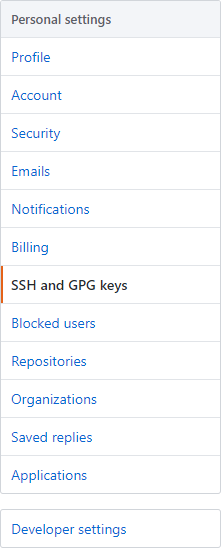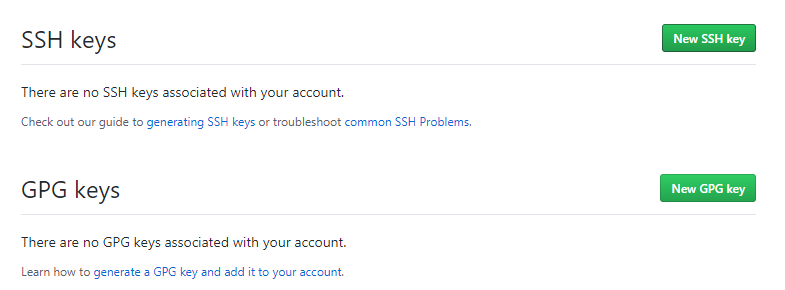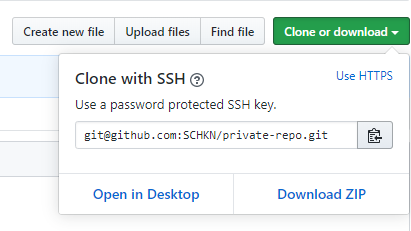How To Add A Ssh Key To Github
Are you using GitHub without setting up SSH Keys? Then, you're really missing out on more security and convenience. SSH Keys are the best ii authentication methods used on GitHub for secure log-in and address modifications to repositories. Well, this tutorial volition help you Setup SSH keys on GitHub easily and in a simpler manner for administration.
If yous want to check whether you take installed and configured Git on your Windows or Linux Bone then make employ of this Git Commands tutorial & dig deep into your main requirement.
- Why utilise an SSH central?
- How to Create SSH keys for Github
- Create SSH keys on Linux using ssh-keygen
- Create SSH keys on Windows using ssh-keygen
- Add SSH primal to your GitHub Account
- Exam GitHub SSH keys
- Troubleshooting
Why apply an SSH Key?
If yous want to access your account in a user-friendly and secured way then it can exist possible by using an SSH Key. It's helpful because you lot don't need to memorize a long password. Too, yous can get your bodily password so brutally long and secure that no human or bot could guess it. The SSH key works as an actual key that simply you control.
- How To Generate Git SSH Keys | Process of Git Generate SSH Key on Windows, Linux, Mac
- Issues with logging into EX Virtual Chassis via SSH and HTTP
- How To Clone a Git Repository | Clone a Git Repository with Command Line & Sourcetree
How to Create SSH keys for Github
Depending on the operating organisation you are using, in that location are two ways ofcreating SSH keys for GitHub.
Do Bank check: How To Generate Git SSH Keys
Create SSH keys on Linux using ssh-keygen
Start of all, let's take a look atcreating SSH keys on Linuxoperating systems.
To create SSH keys on Linux, use the ssh-keygen command with an RSA algorithm (using the "-t" pick)
$ cd ~/.ssh/ && ssh-keygen -t rsa -b 4096 -C "email@example.com"
Note: Information technology is recommended to setup your SSH keys into the .ssh directory of your dwelling directory. Storing them there is more convenient if multiple developers are working on the same repository.
Yous will be prompted with multiple questions.
You tin choose to shop your key in a custom file by typing a custom filename.
You can also choose to leave it blank in social club for information technology to be added to the"id_rsa" existing file.
Generating public/private rsa central pair. Enter file in which to save the central (/domicile/schkn/.ssh/id_rsa): custom_id_rsa Enter passphrase (empty for no passphrase): Enter same passphrase again: Your identification has been saved in custom_id_rsa. Your public key has been saved in custom_id_rsa.pub. The cardinal fingerprint is: SHA256:6yBEAZCCAZCAfdeokgo256452574ffaaz+F6dedefr23222CUXTQc email@example.com The central's randomart paradigm is: +---[RSA 4096]----+ |@*o+=+. E.. | |*+.+o o . | |... =. .... | | . + =. ..o | | . *.o.S . | | . o.= = . | | . o o.+. | | . o.oo | | =*o | +----[SHA256]-----+
Similarly, you can go out the passphrase blank, otherwise, you volition be asked for it as a password when performing operations on your repositories.
The ssh-keygen utility created 2 files for you :
- file_id_rsa: the individual fundamental used in the SSH authentication process. You should non share this individual key by whatsoever ways.
- file_id_rsa.pub: the extension gives the hint that this is the public central of your SSH authentication procedure. This is the key you lot are going to copy to Github in order to perform operations on your repos.
Configure your SSH keys
If yous chose to create the GitHub public key in a separate file, named "custom_id_rsa" for example, you lot need to configure your SSH client in order to have into business relationship this dissever file.
Create a new file named "config" in your.ssh directory and paste the following content into it.
$ sudo nano ~/.ssh/config Host * Hostname github.com User git IdentityFile ~/.ssh/custom_id_rsa
If you chose a dissimilar name, make certain to alter the file proper noun in theIdentifyFileline.
Save your file – you lot should not accept to restart your SSH customer for the changes to exist practical.
Now that your files are set, you lot can skip the next department dedicated to Windows hosts and start importing your keys to GitHub.
Create SSH keys on Windows using ssh-keygen
In order to utilize ssh-keygen on Windows, you need to have theOpenSSH client enabled.
Enabling OpenSSH customer on Windows 10
In order to enable the OpenSSH client, you substantially have two options: by using Powershell or by using the graphical interface.
To enable the OpenSSH client via Powershell, use the "Add-WindowsCapability" option and specify theOpenSSH Customer.
$ Add-WindowsCapability -Online -Name OpenSSH.Customer* Path : Online : True RestartNeeded : Imitation
Note: you need to existadministratorin order to enable OpenSSH on your computer.
Yous can also enable the OpenSSH customer via the graphical interface :
- Click on "Start" and search for "Manage Optional Features"
- Click on "Add together a Feature"
- Search for OpenSSH and install the OpenSSH client
Installing the OpenSSH client on Windows 10 will allow you to perform multiple commands via the Powershell: ssh-add, ssh-keygen (the i we are interested in), ssh-agent, ssh-keyscan, and the ssh executable.
On Windows, for versions greater than Windows vii, you can apply ssh-keygen in order to connect to your remote Git repositories.
Open Powershell and blazon the post-obit commands
$ ssh-keygen Enter file in which to save the fundamental (C:\Users\schkn/.ssh/id_rsa): C:\Users\schkn/.ssh/custom_id_rsa Enter passphrase (empty for no passphrase): Enter same passphrase again: Your identification has been saved in custom_id_rsa. Your public key has been saved in custom_id_rsa.pub. The fundamental fingerprint is: SHA256:WTQ schkn@DESKTOP-PH31996 The cardinal'due south randomart image is: +---[RSA 2048]----+ | o... | | . ... | | . + . . | | E + * = | | . S B o. | | ..= * .. . .| | ..=o* . .o.o.| | +oo+* ..ooo| | .=B+.oo..oo | +----[SHA256]-----+
In the first prompt, y'all tin can choose to save your public key in a dissever file, but you lot will need to specify the entire path to the file.
If y'all chose to create your keys in a carve up file, you will need to create a file named "config" into your .ssh directory
Note: The "config" file needs to have no extension at all, information technology cannot be named "config.txt" for example.
Configure your SSH keys
In order to configure your SSH keys, run the "New-Item" command to create a new file using Powershell.
$ New-Item -Path 'C:/Users/user/.ssh/config' -ItemType File
Note: Y'all have to replace "user" with the actual user using the account
In the configuration file, paste the following content in social club to select the correct key when performing Git commands.
Host * Hostname github.com User git IdentityFile ~/.ssh/custom_id_rsa
Salve your file, and you should be expert to go.
Add together SSH cardinal to your GitHub Business relationship
In social club to add an SSH primal to your GitHub account, head over to the settings of your account and select the "SSH and GPG keys" option in the left carte du jour.

On the right panel, click on the "New SSH cardinal" button in order to create a new SSH central for Github.

When clicking on "New SSH key", you will exist asked to choose a name for your primal and to paste the public cardinal you saved before.
To get the content of your public fundamental on Linux, use the true cat command on your public fundamental file.
$ true cat ~/.ssh/custom_id_rsa.pub ssh-rsa AAAAB3NzaC1yc2EAAAADAQABAAACAQC+HvRnxwPJyUiUO/UCPKrW6mFPgJF8LxsC2lbBePtn+UDv4Xy+eMJRgG5fbaqy2i0tvP+7T7bjVWtO9AAIlclkIVeu5LmV7RaE8H78VXxGVQLcWXvlS0SGlwIxXXd9hBeGh6qPmrya63Ezrt/J1fNy6Ro9s5+ndLogBG2G0JKdAoytbCIBgPmm6sK9nvv3kHrjSK4S0rRz0nb9oaxCQF6V+T75hPgYp+JMOl8yZZMGLN3GPadE2ye2/lskJXzYjlHyjAE6a0g+vrHmMjOULPUrO+aHEA84f email@case.com
Note: Y'all can too use the "cat" command in Powershell
Paste the content of your public fundamental to the dedicated primal text area on GitHub.
Click on "Add SSH key" in guild to complete the process.
A new entry should be added to your SSH keys with the key fingerprint also equally the permissions given by the key (read and write by default)
Congratulations, yous accept successfullyadded your SSH keys to GitHub.
In lodge to validate the unabridged process, we are going to clone a Git repository to our local system.
This is where yous might have authentication failures but multiple solutions will exist provided in guild to solve those bug.
Test GitHub SSH keys
In social club to examination our GitHub SSH keys, let's attempt toclone ane of our repositories on our local server.
In order to find the SSH URL, you lot have to use, head over to your repository and click on the "Clone or download" green button.
Make certain that y'all are using the SSH method past clicking on "Use SSH" if not already selected.

To clone the Github repository, utilise the "git clone" command with the URL provided in the previous box.
$ git clone git@github.com:SCHKN/private-repo.git Cloning into 'individual-repo'... remote: Enumerating objects: iii, done. remote: Counting objects: 100% (iii/3), done. remote: Total 3 (delta 0), reused 0 (delta 0), pack-reused 0 Receiving objects: 100% (3/iii), done.
Crawly!
The repository was correctly fetched from GitHub and you can start working on the codebase.
Troubleshooting
In some cases, yous may not exist able to fetch your repositories from GitHub when setting up SSH authentication.
You lot will probably go the post-obit error when performing elementary git commands on your client
git@github.com: Permission denied (publickey)
This may be happening because of multiple reasons :
- Yourpublic key is not correctly set on GitHub
Make sure in your account settings that your public fundamental is set and that the permissions are too set up properly.
- Yous are using a unlike file from the "id_rsa" default file to shop your keys and you did not create the "config" file into your .ssh directory.
Refer to the previous sections to prepare your "config" file properly.
- Yous are not using theright URL in society to fetch your repositories.
Make sure that y'all are executing your commands every bit the "git" user and non with the GitHub username you are using on the website.
$ git clone git@github.com:SCHKN/private-repo.git <--- Correct $ git clone user@github.com:SCHKN/private-repo.git <--- Incorrect
Conclusion
In this tutorial, you learned how you can set SSH keys for Github accounts and how you volition have to configure them to use custom keys.
If you are curious nearly Git or about software engineering in full general, nosotros take a consummate department dedicated to it on the website, so make certain to read our latest guides.
How To Add A Ssh Key To Github,
Source: https://www.junosnotes.com/git/how-to-setup-ssh-keys-on-github/
Posted by: wallaceuple1986.blogspot.com


0 Response to "How To Add A Ssh Key To Github"
Post a Comment